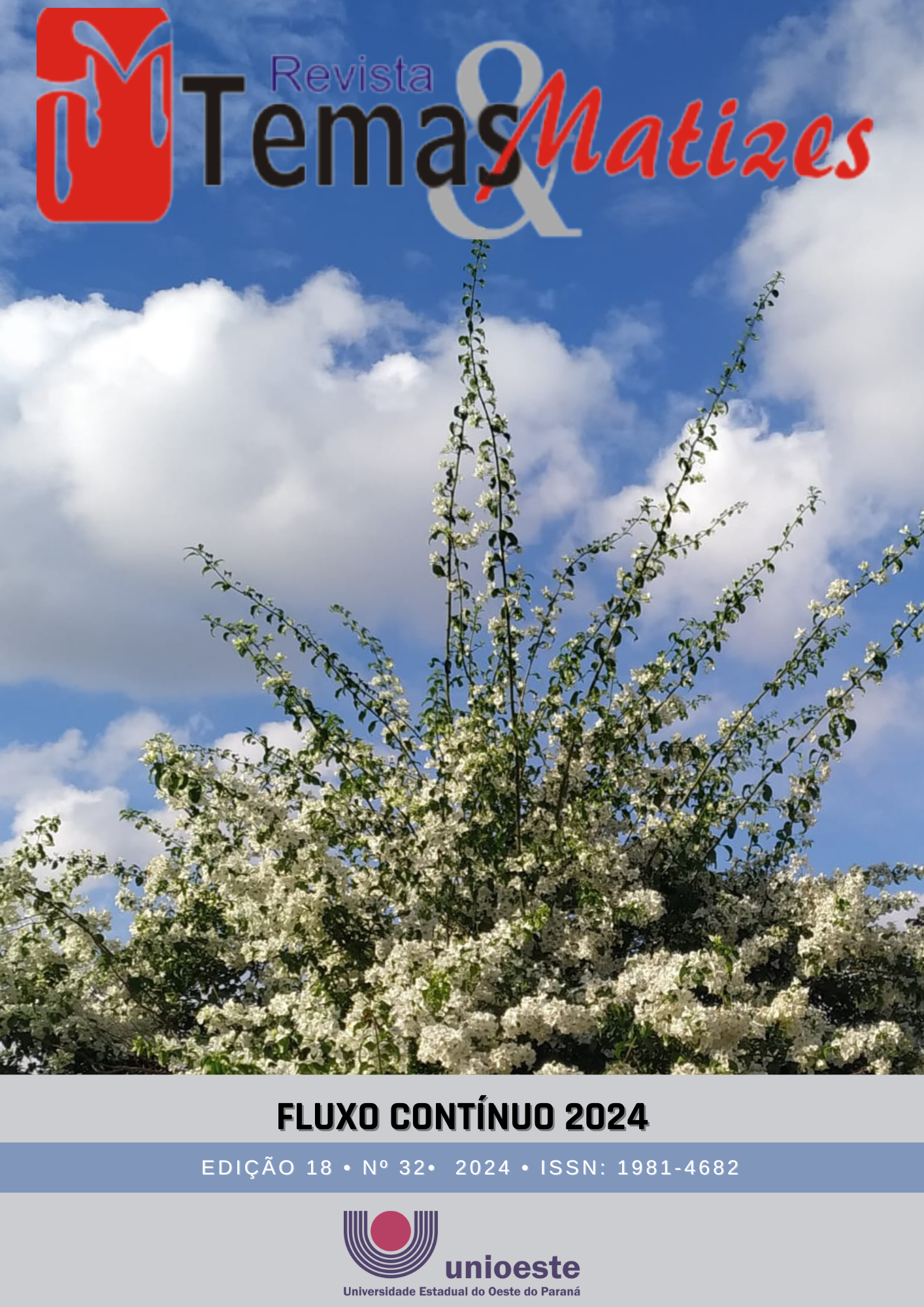Pensamento Computacional, Matemática e Literatura em uma Formação Docente: um desafio interdisciplinar possível
DOI:
https://doi.org/10.48075/rtm.v17i28.30895Keywords:
Interdisciplinaridade; Matemática e Literatura; Pensamento Computacional.Abstract
Interdisciplinary practices and the pedagogical use of digital technologies in education are a challenge for elementary school teachers, as aspects of their initial training relate, among other things, to the integration of these technologies into a didactic design. This field report is the result of a workshop entitled "Interdisciplinarity with Scratch: Is it possible to learn mathematics through literature?" offered to early years elementary education professionals. During this training, which served as a methodological orientation, an explanatory approach was considered with the participants in a dialog about pedagogical practice in schools with literature and mathematics. Starting from the exposition of ideas and oriented towards a computational way of thinking, debates and teaching and learning practices were carried out using Scratch, a visual and block-based programming environment that allows the creation of different tasks and with different topics. The results suggest that this educational activity was innovative and relevant to the participants, understanding the potential of communication between disciplines with a digital platform that presents exploratory situations that not only invite questioning and decision-making, but also highlight deficits in classrooms both in teaching and in the educational path of these teachers.
References
BERGAMO, N. E. Teorias da aprendizagem no contexto da cibercultura. In: IV Seminário Internacional Pessoa Adulta, Saúde e Educação. 2018, Porto Alegre Anais [...]. Porto Alegre: EDIPUCRS, 2018. Disponível em: https://encurtador.com.br/dfzZ0. Acesso em: 19 set. 2022.
BRASIL. Ministério da Educação. Secretaria de Educação Básica. Diretrizes Curriculares Nacionais Gerais da Educação Básica. Diretoria de Currículos e Educação Integral. Brasília: MEC, SEB, DICEI, 2013. Disponível em: http://portal.mec.gov.br/index.php?option=com_docman&view=download&alias=15548-d-c-n-educacao-basica-nova-pdf&Itemid=30192. Acesso: 19 set. 2022.
BRASIL. Base Nacional Comum Curricular: Educação é a base. 2019. Disponível
em: http://basenacionalcomum.mec.gov.br/abase/#fundamental#o-ensino-fundamental-no-contexto-da-educacao-basica. Acesso: 19 set. 2022.
CANDIDO, A. Literatura e Sociedade. Antônio Cândido. 9. ed. Rio de Janeiro: Ouro sobre Azul, 2006.
CARVALHO, F.; BRAGA, M. Pensamento Computacional na Educação Brasileira: um olhar segundo artigos do Congresso Brasileiro de Informática na Educação. Revista Brasileira de Informática na Educação, [S. l.], v. 30, p. 237–261, 2022. Disponível em: https://sol.sbc.org.br/journals/index.php/rbie/article/view/2649. Acesso em: 17 mar. 2023.
FELÍCIO, O. de S.; COSTA, L. G. da; ALMEIDA, W. A. de. Práticas interdisciplinares na formação inicial docente. ISSN 2526-5970. Revista Communitas, [S. l.], v. 6, n. 13, p. 113-126, jan./mar. 2022. Disponível em: https://periodicos.ufac.br/index.php/COMMUNITAS/article/view/6065/3686. Acesso em: 14 mar. 2023.
FORTUNATO, R. P.; CONFORTIN, R. Interdisciplinaridade nas escolas de educação básica: da retórica à efetiva ação pedagógica. Revista de Educação do COGEIME, [S. l.], v. 22, n. 43, p. 76-89, jul./dez. 2013. ISSN 2358-9299. Disponível em: https://www.metodista.br/revistas/revistas-cogeime/index.php/COGEIME/article/view/119. Acesso em: 14 mar. 2023.
FRIGOTTO, G. A Interdisciplinaridade como necessidade e como problema nas Ciências Sociais. Ideação, [S. l.], v. 10, n. 1, p. 41-62, set. 2010. ISSN 1982-3010. Disponível em: http://e-revista.unioeste.br/index.php/ideacao/article/view/4143/3188. Acesso em: 19 set. 2022.
GOMES, L. B. et al. As origens do pensamento sistêmico: das partes para o todo. Pensando famílias, Porto Alegre, v. 18, n. 2, p. 3-16, dez. 2014. Disponível em: http://pepsic.bvsalud.org/scielo.php?script=sci_arttext&pid=S1679-494X2014000200002&lng=pt&nrm=iso. Acesso em: 19 set. 2022.
LOBATO, M. Aritmética da Emília. 28. ed. Ilustr. Manoel V. Filho. São Paulo: Brasiliense, 1994. Disponível em: http://www.miniweb.com.br/cantinho/infantil/38/estorias_miniweb/lobato/aritmetica_da_emilia.pdf. Acesso: 19 set. 2022.
NUNES, N. B. et. al. (Des)pluga: o pensamento computacional em atividades inovadoras. Revista Contexto & Educação, [S. l.], v. 36, n. 114, p. 72 - 88, mai./ago. 2021. Disponível em: https://www.revistas.unijui.edu.br/index.php/contextoeducacao/article/view/11798. Acesso em: 19 set. 2022.
KAMINSKI, M. R. Análise das práticas de informática na educação da Escola Municipal Aloys João Mann - Cascavel/PR. Dissertação (Mestrado em Ensino) – Programa de Pós-Graduação em Ensino, Centro de Educação Letras e Saúde, Universidade Estadual do Oeste do Paraná, Foz do Iguaçu, 2018. Disponível em: http://tede.unioeste.br/handle/tede/4212. Acesso: 19 set. 2022.
SILVA, V. M. T. Literatura infantil brasileira: um guia para professores e promotores de leitura. 2. ed. Goiânia: Cânone Editorial, 2009.
THIESEN, J. da S. A interdisciplinaridade como movimento articulador no processo ensino-aprendizagem. Revista Brasileira Educação [online], [S. l.], v. 13, n. 39, p. 545-554, 2008. Disponível em: http://educa.fcc.org.br/scielo.php?script=sci_arttext&pid=S1413-24782008000300010. Acesso em: 19 set. 2022.
WING, J. M. Computational Thinking. Communications of the ACM, [S.l.], v. 49, n. 3, p. 33-35, mar. 2006. Disponível em: https://www.cs.cmu.edu/~15110-s13/Wing06-ct.pdf. Acesso em: 19 set. 2022.
Downloads
Published
How to Cite
Issue
Section
License

This work is licensed under a Creative Commons Attribution-NonCommercial-ShareAlike 4.0 International License.
Aviso de Direito Autoral Creative Commons
Política para Periódicos de Acesso Livre
Autores que publicam nesta revista concordam com os seguintes termos:
1. Autores mantém os direitos autorais e concedem à revista o direito de primeira publicação, com o trabalho simultaneamente licenciado sob a Licença Creative Commons Attribution que permite o compartilhamento do trabalho com reconhecimento da autoria e publicação inicial nesta revista.2. Autores têm autorização para assumir contratos adicionais separadamente, para distribuição não-exclusiva da versão do trabalho publicada nesta revista (ex.: publicar em repositório institucional ou como capítulo de livro), com reconhecimento de autoria e publicação inicial nesta revista.
3. Autores têm permissão e são estimulados a publicar e distribuir seu trabalho online (ex.: em repositórios institucionais ou na sua página pessoal) a qualquer ponto antes ou durante o processo editorial, já que isso pode gerar alterações produtivas, bem como aumentar o impacto e a citação do trabalho publicado (Veja O Efeito do Acesso Livre).
Licença Creative Commons
Esta obra está licenciada com uma Licença Creative Commons Atribuição-NãoComercial-CompartilhaIgual 4.0 Internacional, o que permite compartilhar, copiar, distribuir, exibir, reproduzir, a totalidade ou partes desde que não tenha objetivo comercial e sejam citados os autores e a fonte.


